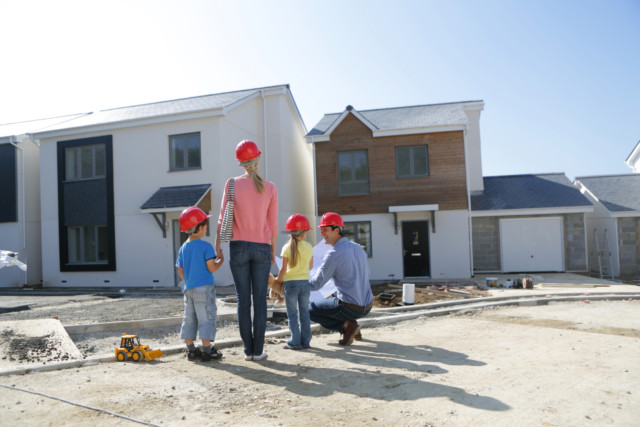THE Consumer Crew are here to solve your problems.
Mel Hunter will take on readers’ consumer issues, Jane Hamilton will give you the best advice for buying your dream home, and Judge Rinder will tackle your legal woes.
This week Boris Johnson vowed to ‘build, build, build’ and construct 180,000 affordable homes
Jane Hamilton, Property Expert
PLEDGING to “build, build, build”, Boris Johnson this week promised £12billion to construct 180,000 affordable homes over the next eight years.
But there are issues with buying a new-build. Here’s what you need to know . . .
 Our property expert looks at the key issues with buying a new-build
Our property expert looks at the key issues with buying a new-build
- Do you want character or convenience? Most new-builds are in “turnkey condition”, meaning you simply move in and unpack your furniture. But if you want traditional features like big fireplaces or high ceilings, you may prefer a period property.
- Is your home leasehold or freehold? A freehold means you own the property, whereas a leasehold only gives you the right to live in it for a set number of years. Most flats are leasehold but so are some new houses. Developers have recently been banned from selling new houses as leasehold, but homes already built can be sold on a lease. Get your solicitor to check as it’s a big difference.
- Are there any covenants or restrictions? Many new developments have rules in place, such as a ban on parking vans in residential streets, hanging washing out or even having a pet dog. Check before you buy.
- Does your property match the plan? The vast majority of new-builds are constructed correctly but there are reports that some have been built smaller than the original plan. Get an expert to assess it before you hand over your cash.
- Is there a service charge? Some new developments have one to maintain communal areas, roads or gardens. Check how much and whether the charges are fixed or “escalating”, which mean they increase every few years.
- Before you move in, get a professional “snagging survey” completed. This will highlight any issues that need fixing, such as a loo that won’t flush or plasterwork cracks. The developer must repair these for you. For more information, see the Homeowners Alliance at hoa.org.uk.
Wimbledon’s still aces it
WIMBLEDON was cancelled but SW19 still aces the competition when it comes to property prices.
Homes near the All England Lawn Tennis Club average just over a million at £1,018,723.
 Homes in SW19 average just over a million at £1,018,723
Homes in SW19 average just over a million at £1,018,723
International tennis fans hoping to net a bargain should head Down Under to Melbourne Park, home to the Australian Open.
Here, properties are just £327,232 – around 20 per cent lower than the Melbourne average – according to a study by estate agent Benham and Reeves.
Judge Rinder, Legal Expert
 Judge Rinder helps a reader who’s housing association refuses to help with damage caused by her neighbour’s leaking water tank
Judge Rinder helps a reader who’s housing association refuses to help with damage caused by her neighbour’s leaking water tank
Q) I AM the owner-occupier of a housing- association upstairs flat. In the loft space there are two water tanks, one for my flat and one for downstairs.
Over the Christmas period the downstairs flat’s tank sprang a leak, resulting in water coming through my ceiling. No one from the association could come out and I was told to put out a bucket to catch the water. But the leak got worse and worse so I called a plumber of my own.
Then later on, a large patch of ceiling paper fell away. I phoned the association, which said it was my responsibility to redecorate. I don’t think this is fair, because the tanks are the responsibility of the association.
Kate, Croydon
A) I do not understand the housing association’s legal position at all.
You appear to have some paperwork proving it is liable for the upkeep of both water tanks.
Given the damage to your property has clearly been caused by one of the tanks, the association is entirely responsible for the damage to your home.
It is legally obliged to redecorate any part of your flat that has been damaged by the flooding.
Write to the housing association enclosing photographs of the ceiling paper and any other damage, asking it to explain why it believes that it is not responsible for the repairs.
I suspect it will be unable to do this.
It might also be wise to obtain a quote from a decorator yourself.
Q) We bought six tickets for a bingo night, at a cost of £90 plus booking fee, but the event never took place due to Covid-19.
We have emailed the company to ask for a refund.
It has said all its events have been postponed, not cancelled, so we have to have credit which must be used within nine months of their events restarting.
As no one knows when or indeed if they will ever restart, surely we are entitled to a refund?
I would like to know what the legal position is.
For other events we had booked, we were given the option to save the tickets for future use or get a refund.
Katherine, Leeds
A) This is not straightforward.
Since lockdown, the responses of companies that had planned events such as this has varied enormously.
You need to check the terms and conditions of your booking but, in normal times you would almost certainly be entitled to a full refund for the ticket price, along with the booking fee, as the event has been cancelled with no newly scheduled date confirmed – which means the organisers are in breach of contract.
The difficulty is that, unless the firm has gone bust, it may be entitled to give you credit for a future event, subject to you being able to attend.
But as it currently stands, the event company hasn’t offered you anything except the promise of attending an event at some unannounced future date. So, in my view, you are entitled to a refund now.
 Katherine paid £90 for six bingo tickets but the event didn’t take place and she wasn’t given a refund
Katherine paid £90 for six bingo tickets but the event didn’t take place and she wasn’t given a refund
Mel Hunter, Reader’s Champion
 Mel Hunter helped a family who were unable to get a refund on their cancelled holiday
Mel Hunter helped a family who were unable to get a refund on their cancelled holiday
Q) MY husband, daughter and I had a ten-night backpacking trip to Thailand booked, leaving Heathrow on April 4, costing £5,436.
On March 20 our holiday was cancelled, the UK changed its travel advice to “against all but essential travel” and Thailand closed its borders.
Flight Centre told us to claim through our travel insurance. It sent us the paperwork and we made a claim. A month later Flight Centre happily provided another letter which I sent to the insurance company straight away.
It declined our claim, saying Flight Centre had said it would offer us a refund credit note. The travel company had never told us this.
All Flight Centre will offer us now is a refund credit note, which we can use to either rebook a holiday or wait up to 18 months for a full refund.
I have requested a cash refund now – my legal right – but it says this is not possible. I am £5,436 out of pocket and disgusted.
Danielle Ward, Dover
A) This was an uncertain time for all those with holidays booked, and Flight Centre added to that confusion, ending in a dead end at your insurer.
I absolutely understand that all travel companies have been struggling through this time, but most have accepted the legal obligation they have to refund customers who choose that option. I asked Flight Centre to do the same. With my involvement, we finally made progress and you got your refund.
A Flight Centre spokesperson said: “Unfortunately, due to the rapid evolution of the Covid-19 crisis and the complex nature of our tailor-made product offering, it has taken longer than expected to process refunds.
“It’s been a difficult time for us, our people and the entire travel industry but we are doing everything we can to rectify this.”
 Daniel says he’s wrongly being charged cancellation bills by TalkTalk
Daniel says he’s wrongly being charged cancellation bills by TalkTalk
Q) WHEN I moved house I arranged for TalkTalk to be my broadband provider.
The engineers came out, but couldn’t set it up properly. Having not used a single megabyte, I was told I could cancel without charge, which I did.
But £25 was taken from my account and a month later I received a £200 cancellation bill. TalkTalk said the £200 would be cancelled, but I then got a £144 bill.
Again I was told this would be cleared. I’m now getting charged £12 a month for not paying these bills. Please help.
Daniel Slater, Burnley
A) TalkTalk confirmed to me that you had been well within your rights to cancel your contract, as you asked to do so within the 14- day cancellation period.
However, it discovered – and admitted – that it failed to scrap the agreement on at least three occasions. With me on the case, and the truth revealed, the bill was waived.
Recognising all the unnecessary stress, TalkTalk sent you £80. A TalkTalk spokesperson said: “We apologise profusely for Mr Slater’s recent experience.
“While the majority of cancellation requests are processed successfully, unfortunate errors were made in this case.
“We have now waived the contract breakage fee and provided a goodwill gesture.”
Maddy Tooke, Coupon Queen
 Our Coupon Queen Maddy Tooke finds her best five freebies of the week
Our Coupon Queen Maddy Tooke finds her best five freebies of the week
MY top five freebies this week are:
- Children’s book, A Greener Future, from Bosch. See bit.ly/boschbook.
- Primary school Maths 4 All learning resources from Amazon. See bit.ly/amazonmaths4all.
- Two indoor skydiving flights for NHS staff from iFly indoor skydiving. Enter your details at bit.ly/nhsfreeskydive to claim. First come, first served.
- Send a thank-you card to a teacher from thankateacher.co.uk. Enter your personal message at bit.ly/thankateacherfree and they will get a card in the post.
- Get a fully legal basic will, checked by a legal executive, in an easy-to-complete online form from ActiveWills. Do yours today at bit.ly/freeactivewills.















